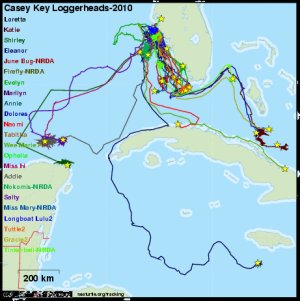Grant: 10-025R
Project Title: Assessment of loggerhead turtle habitats that overlap with reef-fish bottom longline fisheries on the West Florida Shelf
Project Manager: Dr. Tony Tucker
Organization: Mote Marine Laboratory (Non-Profit Organization)
Grant Amount: $33,382.00
Completion Date: 2011-11-30
Summary: The Gulf of Mexico Fisheries Management Council in consultation with National Marine Fisheries Service suggested mitigation measures (collectively known as Amendment 31) in a Reef Fish Bottom Longline Fishery to restructure the fishery, including temporal, spatial, and depth restrictions. However, there are data from previous studies of
satellite tracking of loggerhead turtles on the West Florida Shelf that demonstrate fishery overlap. Therefore, it should be evaluated whether Amendment 31 may require revision to
mitigate the fishery pressure of bycatch on declining loggerhead stocks. The proposal will use satellite tracking technology to better address the key remaining questions that may be
inadequately addressed in Amendment 31 as it currently exists, including (1) the vertical water column use by loggerhead turtles in the zone of overlap, (2) depth isoclines where loggerheads reside for foraging, and (3) residency through the year to test the efficacy of temporal mitigation
measures. Results: The grant for 12 STGP satellite tags was leveraged to expand the project scope to 23 loggerheads. All 23 females were tracked for the entirety of the nesting season and to a final or near final home range. Nine tags remained transmitting as of 5/13/11. Three remigrant turtles were tracked for a second history to evaluate fidelity to the foraging
ground and all three females returned to the same foraging grounds.
Results: The grant for 12 STGP satellite tags was leveraged to expand the project scope to 23 loggerheads. All 23 females were tracked for the entirety of the nesting season and to a final or near final home range. Nine tags remained transmitting as of 5/13/11. Three remigrant turtles were tracked for a second history to evaluate fidelity to the foraging
ground and all three females returned to the same foraging grounds.
Ancillary information gleaned from these tracked turtles builds upon and extends the
contributions made by related or previous projects (STGP 06-021R, 07-024R, 08-019R, 09-
001R) on site fidelity, reproductive capacity, and stable isotopes. The 2010 tracking was also
able to highlight potential impacts of petroleum spills on turtles in the Gulf of Mexico during the
BP oil spill. Conservation concerns were identified for turtle migrations that crossed
international boundaries to foraging grounds in Mexico (4), the Bahamas (4), Cuba (2), and
Jamaica (1). Foraging grounds identified within US national boundaries included Florida Keys
(3), Everglades (1), Tampa Bay (1), Charlotte Harbor (1), open water between Everglades and
Keys (3), coastal neritic residency (2), and pelagic residency (3). The category of pelagic residency upon the West Florida shelf documented that 13% (3/23) of the 2010 tracked cohort
occupied a zone of habitat overlap with the bottom long-line fishery. These cumulative results
(2005-2010) reinforce that 21% (18/86) of tracked Casey Key loggerheads enter fishing zones of
concern for the Gulf bottom long-line fishery.